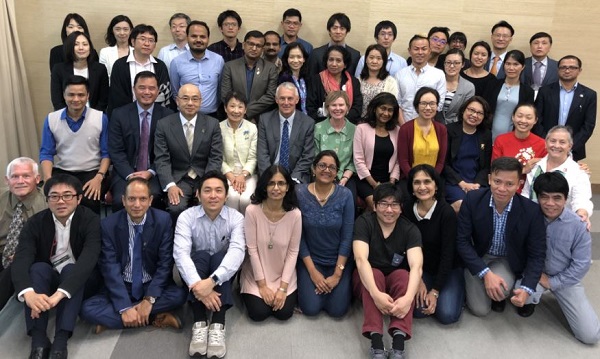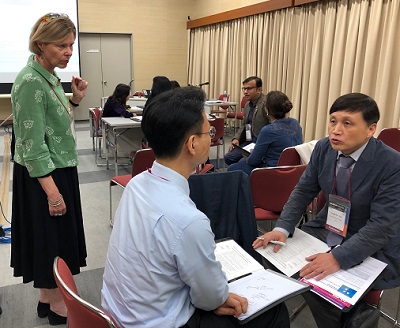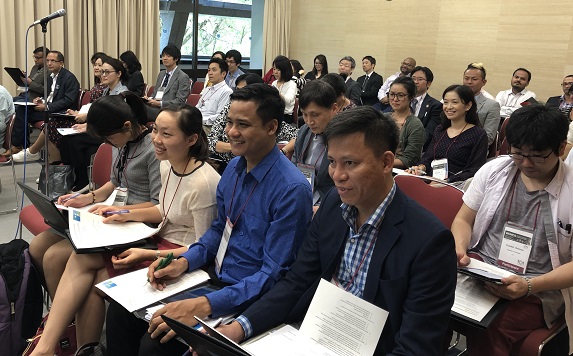Improving care of patients with depression and anxiety at WONCA Kyoto
 Shelly B Rodrigues, Deputy Executive Vice President, California Academy of Family Physicians and Chris Larrison, Principal, Healthcare Performance Consulting Inc, report on workshops at the recent WONCA Asia Pacific region conference in Kyoto on improving care of patients with depression and anxiety.
Shelly B Rodrigues, Deputy Executive Vice President, California Academy of Family Physicians and Chris Larrison, Principal, Healthcare Performance Consulting Inc, report on workshops at the recent WONCA Asia Pacific region conference in Kyoto on improving care of patients with depression and anxiety.
The California Academy of Family Physicians (CAFP) and Healthcare Performance Consulting (HPC) have been working with the WONCA for the past five years on a variety of educational needs assessments and learning activities. A third partner, Interstate Postgraduate Medical Association, has been engaged in our global work as well.
Results of the needs assessment completed at WONCA’s 2017 Pacific region conference in Thailand were published in the Journal of Family Physicians and Primary Care (2019, volume 8, issue 3). This assessment led to the development of our latest project, “Improving Our Care of Patients with Depression and Anxiety,” which highlights the issues family doctors in the Asia Pacific region (APAC) and Japan face with their patients.
This project includes both workshops and webinars with community faculty and the requirement for these faculty members to then teach what they have learned to at least two groups in their home countries.

A renowned master clinical faculty, including Chris Dowrick, UK; Ryuki Kassai, Japan; Jill Benson, Australia (tutor in photo at right); and Cindy Lam, Hong Kong; all members of the WONCA working group on mental health, and CAFP member and past president, Jay Lee MD, has been engaged since the beginning on curriculum design and workshop/webinar implementation.
This initiative’s ultimate goal is to improve the care of patients with depression and anxiety by expanding the competence and confidence of family physicians to:
- Assess and manage depression and anxiety
- Employ shared decision making with patients
The first workshop, a pilot of the project, was held at the WONCA World conference in Seoul, in October 2018 with eight family doctors from APAC and Japan in attendance. The workshop was followed by a series of three webinars, each with time for question and answer and community physician reports. We discussed topics like shared decision making, pharmacological and non-pharmacological management of depression, mindfulness and collaboration with specialist colleagues.
Our second workshop was held at the WONCA meeting in Kyoto in May 2019. The 33 Asia Pacific and Japanese family doctors who attended the workshop will take their learnings to family physicians and caregivers in their region. The workshop was designed with adult education principles in mind, including a combination of didactic lecture, small group learning and role play to facilitate maximum learning. The curriculum also includes a session on presentation skills, with practice and feedback opportunities.
In Kyoto, we held the workshop in two one-half days sessions, with the agenda content divided between time for conjoint learning and time for the APAC physicians (taught in English) and Japanese physicians (taught in Japanese) to meet separately. Four of the Seoul attendees also attended the Kyoto meeting and two of the Japanese family doctors who attended the pilot in Seoul served as faculty for the Japanese Kyoto section. This divide supported both the need for more time and the language issues identified in the pilot program.
Our community faculty, led by various master faculty members, talked about screening, diagnosis, treatment and management of depression and anxiety. Pharmacological and non-pharmacological options for care were included, as well sessions on psychosocial aspects of mental illness, mindfulness and reflection. Presentation skills were practiced as community faculty members gave three-to-five-minute talks on topics of their choice.

The evaluations for this workshop were quite positive, and post-test scores for all but one question were higher that pre-test scores, with an overall improvement from 85 to 90 percent. Our attendees rated the workshop 4.6 out of 5 for making them more effective in practice, and said they thought the practical tips on bringing up depression and anxiety with patients during consultation were most valuable.
The first webinar for this group was held June 24, with a topic of assessing suicide risk. Two webinars remain, and interest is high to expand the program.
The project also includes a portal for the master faculty and community faculty to use for sharing ideas, reporting on local meetings, and accessing tools and resources. The project webinars are recorded and posted in the portal for repeat watching and for the use of those not able to attend the live session. We continue to add new tools and resources to the project portal, including a tip sheet on how to facilitate role play, the BATHE technique, PHQ-9 and GAD-7 screening tools, and more.
We are excited to see where the community faculty members take this project, and how the family doctors in their countries grow in their skill and competence in caring for this important patient population.